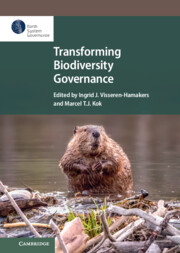Abbreviations
- ABMTs
– area-based management tools
- ABNJ
– areas beyond national jurisdiction
- ABS
– access and benefit-sharing
- ACP
– African, Caribbean and Pacific
- AHTEG
– ad hoc technical expert group
- ART
– architecture for REDD+ transactions
- ATS
– Antarctic Treaty System
- BBNJ
– Marine Biodiversity Beyond the Limits of National Jurisdiction
- BCC
– Benguela Current Convention
- BECCS
– bioenergy with carbon capture and sequestration
- BIC
– biodiversity impact chain
- BIOFIN
– Biodiversity Finance Initiative
- BIOPAMA
– Biodiversity and Protected Areas Management Program
- BPI
– biodiversity policy integration
- C40
– C40 Climate Leadership Group
- CAP
– Common Agricultural Policy
- CBD
– Convention on Biological Diversity
- CBFP
– Congo Basin Forest Partnership
- CCA
– community conserved area
- CDR
– carbon dioxide removal
- CHM
– common heritage of mankind
- CITES
– Convention on International Trade in Endangered Species of Wild Fauna and Flora
- CO2
– carbon dioxide
- COBA
– community based group
- COP
– Conference of the Parties
- CMS
– Convention on the Conservation of Migratory Species of Wild Animals
- COST
– European Cooperation on Science and Technology
- CRA
– environmental reserve quota (Cota de Reserva Ambiental)
- CSCP
– Collaborating Centre on Sustainable Consumption and Production
- DAC
– direct air capture
- DSI
– digital sequence information
- EC
– European Commission
- EBSAs
– ecologically or biologically significant marine areas
- EID
– emerging infectious disease
- ES
– ecosystem services
- ESG
– environmental, social and governance
- EU
– European Union
- FAO
– Food and Agriculture Organization
- FAWC
– Farm Animal Welfare Council
- FPIC
– free, prior and informed consent
- GBF
– Global Biodiversity Framework
- GCA
– Global Commission on Adaptation
- GEF
– Global Environment Facility
- GELOSE
– Gestion Locale Sécurisée (secured local managed forests law)
- GM
– genetically modified
- IAS
– invasive alien species
- ICC
– International Chamber of Commerce
- ICCAs
– Indigenous and community conserved areas
- ICDP
– integrated conservation and development project
- ICLEI
– International Council for Local Environmental Initiatives (now Local Governments for Sustainability)
- IG
– integrative governance
- IMET
– Integrated Management Effectiveness Tool
- IPBES
– Intergovernmental Science-Policy Platform on Biodiversity and Ecosystem Services
- IPCC
– Intergovernmental Panel on Climate Change
- IPLC
– Indigenous peoples and local communities
- IPRs
– intellectual property rights (including patents)
- ITPGRFA
– International Treaty on Plant Genetic Resources for Food and Agriculture
- IUCN
– International Union for the Conservation of Nature
- IUU
– illegal, unreported and unregulated
- KBA
– key biodiversity area
- KIFCA
– Kyeintali Inshore Fisheries Co-Management Association
- LBSAPs
– local biodiversity strategies and action plans
- LED-R
– low emissions rural development
- LME
– large marine ecosystem
- LMMA
– locally managed marine areas
- LMOs
– living modified organisms
- MA
– Millennium Ecosystem Assessment
- MARISMA
– Marine Spatial Management and Governance Project
- MAT
– mutually agreed terms
- METT
– Management Effectiveness Tracking Tool
- MGR
– marine genetic resources
- MPA
– marine protected area
- MSP
– marine spatial planning
- NAMA
– nationally appropriate mitigation action
- NBSAPs
– national biodiversity strategies and action plans
- NCP
– nature’s contributions to people
- NEOH
– Network for EcoHealth and One Health
- NGFS
– Network for Greening the Financial System
- NGO
– nongovernmental organization
- ODA
– official development assistance
- OECD
– Organisation for Economic Co-operation and Development
- OECMs
– other effective area-based conservation measures
- OIE
– [Office International des Epizooties] World Organisation for Animal Health
- PA
– protected area
- PAME
– Protected Area Management Effectiveness
- PES
– payments for ecosystems services
- PIC
– prior informed consent
- PIP Framework
– Pandemic Influenza Preparedness Framework
- PPP
– public–private partnerships
- RAN
– Rainforest Action Network
- REDD+
– Reducing Emissions from Deforestation and Forest Degradation
- RFMOs
– regional fisheries management organizations
- RoN
– Rights of Nature
- RTQMM
– Rio Tinto QIT Madagascar Mineral
- SBSTTA
– Subsidiary Body on Scientific, Technical and Technological Advice
- SDGs
– sustainable development goals
- SOI
– Sustainable Ocean Initiative
- SRM
– solar radiation modification
- TBG
– transformative biodiversity governance
- TEEB
– the economics of ecosystems and biodiversity
- TRIPS
– trade-related aspects of intellectual property rights
- UFF
– Unlocking Forest Finance
- UN
– United Nations
- UNCLOS
– United Nations Convention on the Law of the Sea
- UNDP
– United Nations Development Programme
- UNDRIP
– United Nations Declaration on the Rights of Indigenous Peoples
- UNEP
– United Nations Environment Programme
- UNESCO
– United Nations Educational, Scientific and Cultural Organization
- UNFCCC
– United Nations Framework Convention on Climate Change
- UNFSA
– United Nations Fish Stocks Agreement
- UNGA
– United Nations General Assembly
- WCPA
– World Commission on Protected Areas
- WCS
– Wildlife Conservation Society
- WEF
– World Economic Forum
- WHO
– World Health Organization
- WIPO
– World Intellectual Property Organization
- WRI
– World Resources Institute
- WTO
– World Trade Organization



